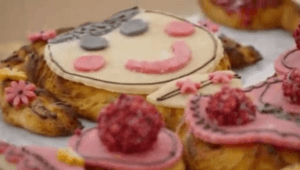News
News in Digest: Who knew Danish baking was so fecking tough?
This article is more than 7 years old.
‘The Great British Bake Off’ challenged its contestants to make æbleskiver, rye bread and pastries … with mostly disastrous results

There were a few high points, but mostly low (photo: screenshot)
‘The Great British Bake Off’ may have inspired one of Denmark’s most popular programs, but it hadn’t returned the compliment until this October, when it held its first ever Danish Week on the show.
Is the love affair burning brightly?
Danish co-host Sandi Toksvig set the challenge for Episode 8 to the remaining five bakers vying for a place in the semi-finals, and the Guardian newspaper, the country’s biggest Danophile (since the 2011 broadcast of ‘Forbrydelsen’ – ‘The Killing’), could not resist supplying a live text feed to accompany the episode.
As far as love affairs go, Denmark and the Guardian’s is long-running, encompassing Faroese knitwear, the joys of ‘Borgen’ and ‘The Bridge’, hygge and lykke, and Nordic Noir, cuisine and design, but is the romance still burning as fiercely as a tea light candle?
Or has the Guardian, like a well-seasoned expat, started to become a little cynical of all things being Danish being good?
Not so happy in the kitchen
Well, this episode proved one thing: making Danish breads, pastries, sweets and æbleskiver is no cakewalk, as the contestants did their best to balls up everything.
Talking of balls (of the doughy variety covered in icing sugar and dipped in jam), the æbleskiver hugely challenged the contestants, possibly because they didn’t have those handy bulbous pans made especially for the task. The feedback ranged from bad – “stodgy” and “inconsistent” – to appalling: “burned on the outside and raw on the inside”.
The pastry challenge was not much better, yielding efforts that were “underproved and soggy”, “burned and dry” and “overbaked on the outside and underbaked on the inside”.
Meanwhile, a smørrebrød/rye bread (rugbrød) round produced tandoori flavours, which prompted one Danish online commenter to write on the Guardian website: “I am shocked. Shocked I am. Shocked, I tell you. None of those breads resembled proper rye bread, which is really more like pumpernickel.”
While a challenge to make a traditional Danish birthday cake shaped like a person (kagemand or kagekone) enabled the Guardian to remind its readers that apparently all Danish people cheer when the head is cut off, which is why they’re the “happiest people on the planet”.
Obligatory swigs of Carlsberg
As is customary with many TV programs show in Britain, there were drinking rules, and the live feed’s author, Heidi Stephens, wasted little time in laying down the rules, after instructing her readers to “light a few candles, grab a blanket and give your viewing space a touch of Danish hygge”.
A swig of Carlsberg was obligatory every time Toksvig spoke Danish, or when a Viking, pickled herring or hygge reference was made, or if one of the contestants homaged the works of Hans Christian Andersen in their creation.
Should either of the co-hosts have dressed as Vikings, it would have been finish-the-bottle time.
“I’m assuming this was a mandatory clause in Sandi’s contract, or some kind of reciprocal government deal that requires Denmark to back our shabby Brexit plan in exchange for us sending planeloads of Brits to Copenhagen to eat bacon and blue cheese,” concluded the live report, which was, selvfølgelig, littered with Danish phrases from “god aften” to “velkommen” to “mange tak”.
But the last word must be given to the commenter who asked: “Who knew Danish baking was so fecking tough??”










































